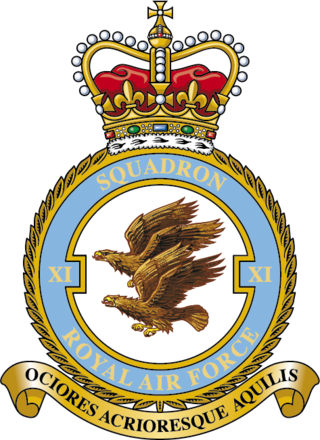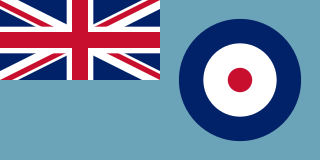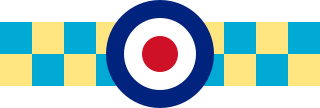
Royal Air Force Coningsby or RAF Coningsby, is a Royal Air Force (RAF) station located 13.7 kilometres (8.5 mi) south-west of Horncastle, and 15.8 kilometres (9.8 mi) north-west of Boston, in the East Lindsey district of Lincolnshire, England. It is a Main Operating Base of the RAF and home to three front-line Eurofighter Typhoon FGR4 units, No. 3 Squadron, No. 11 Squadron and No. 12 Squadron. In support of front-line units, No. 29 Squadron is the Typhoon Operational Conversion Unit and No. 41 Squadron is the Typhoon Test and Evaluation Squadron. Coningsby is also the home of the Battle of Britain Memorial Flight (BBMF) which operates a variety of historic RAF aircraft.

No. 11 or XI Squadron, is "the world's oldest, dedicated fighter unit" and continues the traditions established by the similarly numbered Royal Flying Corps squadron, established in 1915. After a history of equipment with numerous different aircraft types, the squadron most recently operated the Tornado F3 until 2005 when it was disbanded. It was reactivated in 2006 to operate the Typhoon F2, receiving its first aircraft on 9 October 2006.

Number 6 Squadron of the Royal Air Force operates the Eurofighter Typhoon FGR.4 at RAF Lossiemouth. It was previously equipped with the SEPECAT Jaguar GR.3 in the close air support and tactical reconnaissance roles, and was posted to RAF Coltishall, Norfolk until April 2006, moving to RAF Coningsby until disbanding for the first time in its history on 31 May 2007. The squadron officially reformed as a Typhoon squadron on 6 September 2010. No. 6 Squadron is unique in having two Royal standards, having been awarded its second one by King Abdullah I of Jordan in October 1950 due to its long period of service in the Middle East.

Number 3 Squadron, also known as No. 3 (Fighter) Squadron, of the Royal Air Force operates the Eurofighter Typhoon FGR.4 from RAF Coningsby, Lincolnshire, since reforming on 1 April 2006. It was first formed on 13 May 1912 as one of the first squadrons of the Royal Flying Corps – being the first to fly heavier than air aircraft.

Number 12 Squadron, also known as No. 12 (Bomber) Squadron and occasionally as No. XII Squadron, is a flying squadron of the Royal Air Force (RAF). The squadron reformed in July 2018 as a joint RAF/Qatar Emiri Air Force squadron. It is currently based at RAF Coningsby, Lincolnshire, and operates the Eurofighter Typhoon FGR4, while temporarily integrating Qatari air and ground crews in order to provide training and support as part of the Qatari purchase of 24 Typhoons from the UK.

No. 9 Group RAF was a group of the Royal Air Force, which existed over two separate periods, initially at the end of the First World War, and latterly during the Second World War when its role was air defence.

No. 1 Group of the Royal Air Force is one of the two operations groups in RAF Air Command. Today, the group is referred to as the Air Combat Group, as it controls the RAF's combat fast-jet aircraft and has airfields in the UK, as well as RAF Support Unit Goose Bay at CFB Goose Bay in Canada. The group headquarters is located alongside Headquarters Air Command at RAF High Wycombe, Buckinghamshire. The other operational group is No. 2 Group RAF.

No. 609 Squadron of the Royal Auxiliary Air Force, originally formed as a bomber squadron and in the Second World War active as fighter squadron, nowadays provides personnel to augment and support the operations of the Royal Air Force. The squadron is no longer a flying squadron, but instead has the role of Force Protection. It is currently based at RAF Leeming, North Yorkshire.

No. 245 Squadron was a squadron of the Royal Air Force. It flew as an anti-submarine squadron during World War I and as a fighter squadron during World War II. After the war it was first a jet-fighter squadron and its last role was as a radar-calibration unit.
No. 193 Squadron RAF was a fighter squadron of the Royal Air Force during World War II.

No. 266 (Rhodesia) Squadron RAF was a squadron of the Royal Air Force.
No. 198 Squadron was a Royal Air Force aircraft squadron that operated during the Second World War particularly in the ground attack role as the allies advanced through continental Europe.
No. 195 Squadron was a Royal Air Force aircraft squadron that operated during the Second World War, at first in the ground attack role and later as heavy bomber unit with the Avro Lancaster.
No. 168 Squadron RAF was a Second World War Royal Air Force squadron that operated the North American Mustang on missions over occupied Europe and in support of the D-Day landings.
No. 137 Squadron RAF existed briefly as a day bomber unit in World War I but never became operational. During World War II it flew as one of the two Whirlwind squadrons before converting to Hurricane Mk.IV fighter-bombers and later the Hawker Typhoon in the same role. The squadron was disbanded in August 1945.
No. 174 (Mauritius) Squadron RAF was a Royal Air Force Squadron that was a fighter-bomber unit in World War II.
No. 197 Squadron RAF was a Royal Air Force Squadron formed in World War I and reformed as a fighter-bomber unit in World War II.
No. 181 Squadron RAF was a Royal Air Force Squadron formed as a fighter-bomber unit in World War II.
No. 135 Expeditionary Air Wing previously No. 135 Wing is a wing of the Royal Air Force. It was stationed at RAF Leeming, controlling the deployable subunits of the base. It was activated on 1 April 2006 as part of a modernisation package to make the RAF more deployable on an expeditionary basis.
No. 121 Expeditionary Air Wing is a deployable Expeditionary Air Wing of the Royal Air Force based at RAF Coningsby, Lincolnshire, England, UK.









